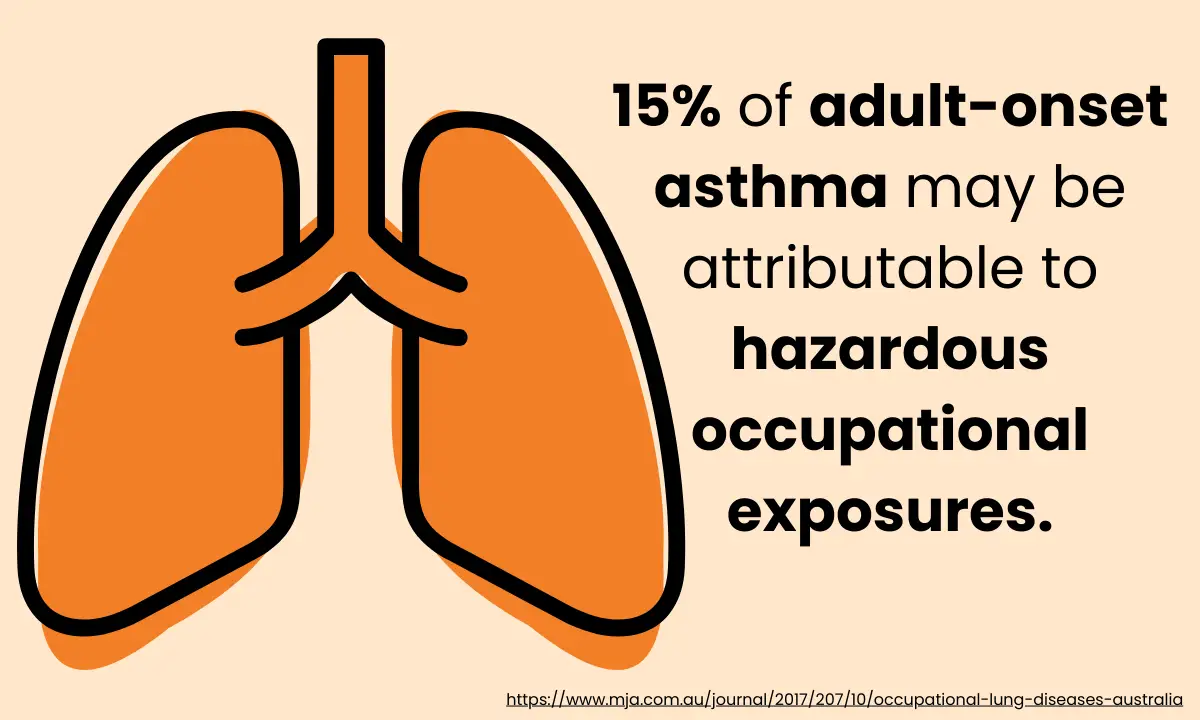Workplace injuries don’t always involve dramatic accidents. Sometimes, the injury builds over time, often unnoticed until it becomes life-altering. Occupational asthma is one such condition, affecting countless workers exposed to harmful substances.
If you’re suffering from occupational asthma, you might wonder: What are my rights? Can I claim compensation? This guide will walk you through everything you need to know about workers’ compensation for occupational asthma—and how Withstand Lawyers can help you take control of your future.

What Is Occupational Asthma?
Occupational asthma is a type of asthma caused or worsened by exposure to irritants in the workplace. Unlike regular asthma, which can be linked to genetics or environmental factors outside of work, occupational asthma develops as a direct result of your work environment.
Common Symptoms of Occupational Asthma
Occupational asthma can display as a variety of symptoms, many of which significantly disrupt daily life and your ability to perform at work. Recognising these symptoms early is crucial, as untreated occupational asthma can worsen over time and lead to long-term health complications.
Common symptoms of occupational asthma include:
- Wheezing and shortness of breath
- Chest tightness or pain
- Chronic coughing, especially during or after work
- Difficulty sleeping due to breathing problems
If you’re experiencing these symptoms, it’s essential to seek medical attention and take steps toward managing your condition. With proper treatment and support, you can mitigate the impact of occupational asthma on your quality of life—and if your condition is work-related, you may be entitled to workers’ compensation benefits to secure your financial and medical needs.

Conditions, Jobs, and Situations That Can Cause Occupational Asthma
Certain jobs and work environments carry a higher risk of exposure to irritants that can cause occupational asthma. Below are some common triggers and the industries often linked to occupational asthma.
Common Triggers of Occupational Asthma
Certain substances found in workplaces are known to cause or exacerbate asthma. These include:
- Dust: Wood dust, flour dust, and construction dust are common culprits. It’s important to note that if it’s caused by dust particles and results in a chronic disease, it may instead be a dust disease claim not workers compensation lawyers. Our workers compensation lawyers can inform you which claim should be made.
- Chemical Fumes: Isocyanates in paints, adhesives, and foam manufacturing can trigger respiratory issues.
- Animal Allergens: Proteins from animals, often encountered by veterinarians, lab workers, or farmworkers.
- Mould and Spores: Common in humid environments, agriculture, or poorly ventilated workplaces.
- Fumes from Welding or Soldering: Metal particles and gases from these processes can harm the respiratory system.
Jobs Linked to Occupational Asthma
Certain professions are more likely to expose workers to these hazardous substances. High-risk jobs include:
- Construction Workers: Frequent exposure to dust, paints, and adhesives.
- Healthcare Professionals: Regular contact with cleaning chemicals and latex gloves.
- Factory Workers: Chemical manufacturing or processing can release airborne irritants.
- Bakers and Food Workers: Flour dust and food additives are common asthma triggers.
- Cleaners and Janitors: Exposure to harsh cleaning products and aerosols.
- Agricultural Workers: Pollen, moulds, and livestock allergens pose significant risks.
Situations That Increase Risk of Occupational Asthma
- Poor Ventilation: Workplaces lacking adequate airflow can lead to higher exposure to airborne irritants.
- Prolonged Exposure: Repeated contact with harmful substances over months or years significantly raises the risk.
- Lack of Protective Equipment: Employers failing to provide masks or respirators increase vulnerability.
By understanding these conditions, jobs, and situations that cause occupational asthma, workers can identify potential hazards and take steps to protect themselves—or seek compensation if they’ve already developed symptoms.
Our trusted team of workplace injury lawyers can assess your claim so you know where you stand. Contact us today for a free claim check to find out if you are eligible to make an occupational asthma workers compensation claim.

Entitlements for Occupational Asthma Workers’ Compensation
Workers’ compensation is designed to provide financial and medical support to those injured on the job. If your claim is successful, you may be entitled to:
- Medical Expenses: coverage for treatments, medications, and therapies related to your asthma.
- Income Support: weekly payments if your condition prevents you from working temporarily or permanently.
- Rehabilitation Services: assistance with re-training or transitioning to a new role if you cannot return to your previous job.
- Lump-Sum Payment for Permanent Impairment: if your occupational asthma leads to a long-term or permanent disability, you may be entitled to a substantial lump-sum payment. This one-time compensation is designed to recognize the lasting impact of your condition on your ability to work and live a normal life.
Every workers’ compensation claim is unique, and the entitlements you may be eligible for depend on your specific circumstances. Contact our experienced workers’ compensation lawyers for tailored advice and guidance at no cost to you. Our fees are covered by the Independent Review Office (IRO) so you pay nothing out of pocket or out of your settlement monies. We simplify the entire process and can advise you on what your claim could be worth. Complete the form for a free claim assessment and get your workers compensation claim started today.
How to Make a Compensation Claim for Occupational Asthma
Seek Medical Support and Diagnosis
If you suspect you’re suffering from occupational asthma, the first and most crucial step is to consult your GP. This step lays the foundation for a successful workers’ compensation claim and ensures your condition is properly managed. Here’s how your GP can help you:
Diagnose Your Condition:
Your doctor will assess the severity of your occupational asthma and determine how it affects your ability to work. This medical evaluation is critical to understanding the extent of your condition.Establish the Workplace Connection:
For your workers’ compensation claim to succeed, your GP must document the link between your occupational asthma and your workplace. This includes detailing the irritants or allergens that caused or exacerbated your condition. This connection is essential evidence for your claim.Obtain a Work Capacity Certificate:
Your GP will issue a Work Capacity Certificate, which outlines your diagnosis, the impact of your occupational asthma on your ability to perform your job, and the treatments or accommodations you require. This certificate is a key document in your workers’ compensation claim.
Taking these steps with the guidance of your GP not only helps you manage your condition but also strengthens your case for occupational asthma workers’ compensation.
Notify Your Employer
It’s essential to notify your employer about your occupational asthma as soon as possible. Providing timely and accurate information ensures they can report your condition to their insurer, which is a necessary step in processing your workers’ compensation claim.
Lodge Your Workers Compensation Claim
After notifying your employer about your occupational asthma, the next step is to submit your claim through their workers’ compensation insurer. To strengthen your claim and ensure a smooth process, you’ll need to provide the following:
Completed Workers’ Compensation Claim Form:
This form outlines your condition, how it relates to your workplace, and the compensation you are seeking.Work Capacity Certificate and Medical Reports:
Include your Work Capacity Certificate and any supporting medical documentation from your GP or specialist. These reports must clearly link your occupational asthma to your job.Relevant Workplace Documents:
Gather evidence such as incident reports, emails, or witness statements to support your claim. These documents demonstrate the connection between your asthma and workplace conditions.
By submitting these materials to the insurer, you take a critical step toward securing workers’ compensation for occupational asthma. Ensuring your paperwork is thorough and accurate can make a significant difference in the outcome of your claim.
Insurer’s Decision
Once you’ve submitted your claim, the insurer will assess it to decide whether to approve or deny your request for compensation. During this process, they may reach out to your healthcare providers, employer, or other relevant parties to gather additional information about your condition and its link to your workplace.
If the insurer approves your claim, you’ll start receiving workers’ compensation entitlements, which may include:
- Weekly Payments: if your occupational asthma prevents you from working.
- Medical Expense Coverage: for treatments, medications, and therapies related to your condition.
- Rehabilitation Services: assistance with recovery or transitioning to a different role if needed.
The entitlements you receive will depend on the severity of your occupational asthma and its impact on your ability to work. You may also be entitled to a lump sum payment depending on the extent of your injury.

Can You Also Make a Common Law Claim for Occupational Asthma?
If your occupational asthma was caused by your employer’s negligence, you may be eligible to make a common law claim, also known as a work injury damages claim. A common law claim focuses on holding your employer accountable for failing to provide a safe work environment.
To qualify for a common law work injury damages claim, the following criteria must be met:
Your Whole Person Impairment (WPI) Rating Is 15% or Greater:
Your WPI is assessed by an Independent Medical Examiner (IME), who evaluates the extent of your permanent impairment. We can assist in organising this assessment to ensure your claim is properly supported.Your Employer Was Negligent:
Negligence occurs when your employer fails to provide a safe working environment. Examples include not supplying protective equipment, inadequate ventilation, or insufficient training to prevent exposure to workplace hazards.A work injury damages claim provides a substantial lump-sum payout to compensate for past and future loss of earnings caused by your injury. However, it’s important to understand that accepting this payout means you forfeit any ongoing weekly payments and medical expense coverage under workers’ compensation.
This can be a difficult and significant decision, and we strongly recommend speaking with our team of experienced work injury damages lawyers to fully understand your options.
We offer a free consultation for new clients, and with our legal fees covered by the Independent Review Office (IRO) there are no out-of-pocket costs to make a claim. Let us guide you through the process and help you maximise your claim.
Total, Permanent Disability claims – Another payout separate to your workers compensation claim
If you’re unable to work due to an injury or condition, you could also be entitled to make a Total, Permanent Disability (TPD) claim through the insurance within your existing superfund accounts. Our TPD Lawyers can do a free eligibility check and inform you whether you would be eligible. This is separate to your entitlements to workers compensation and one doesn’t affect the other.
Navigating an Occupational Asthma Workers’ Compensation Claim with Withstand Lawyers
Making an occupational asthma workers’ compensation claim can feel overwhelming, but you don’t have to face it alone. At Withstand Lawyers, we understand the physical, emotional, and financial challenges that come with workplace injuries, and we’re here to guide you through the process every step of the way.
Here’s why our clients trust us with their occupational asthma workers’ compensation claims:
Decades of Experience
With years of experience, we’ve helped countless individuals secure compensation for occupational asthma and other workplace injuries. Our tailored approach ensures that every client’s unique circumstances are addressed for the best possible outcome.
No Out-of-Pocket Costs
The Independent Review Office (IRO) covers all legal fees and disbursements for occupational asthma claims, meaning no hidden costs, no deductions, and zero financial risk when you work with us.
Compassionate and Personalised Support
We combine expert legal knowledge with genuine empathy. Our team takes the time to understand your condition and your story, providing clear and supportive guidance throughout the entire claims process.
Proven Track Record of Success
From weekly payments and medical expense coverage to lump-sum compensation and work injury damages claims, we’ve achieved life-changing results for clients suffering from occupational asthma.
Free Claim Assessment
Not sure if you’re eligible for occupational asthma workers’ compensation? We offer a free, no-obligation assessment to review your case, explain your entitlements, and help you move forward with confidence.
Choose Withstand Lawyers for dedicated, expert support focused on achieving the best outcome for your claim. Call us on 1800 952 898 or complete the contact form to start your claim today.

Issa Rabaya
• Bachelor of Laws
• Graduate Diploma in Legal Practice
• Approved Legal Service Provider to the Independent Review Office
• Member of the Law Society

Issa Rabaya
• Bachelor of Laws
• Graduate Diploma in Legal Practice
• Approved Legal Service Provider to the Independent Review Office
• Member of the Law Society




